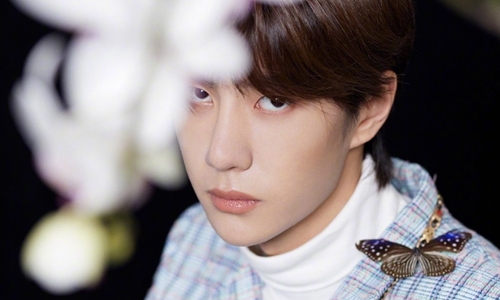
Wang Yibo Photo: Sina Weibo
China's social media, video and music platforms, which have been the main venues for Chinese fans to battle for their beloved stars' popularity, are rushing to remove content and close accounts while the country is implementing a fierce crackdown against fanquan (fans' circles) chaos.
However, despite the quick action in response to the government's measures, it is also true that these platforms have failed to assume their due responsibility to help the authorities regulate cyberspace and guide youngsters to hold correct values, Chinese experts pointed out, calling for management of platforms as well to prevent future chaos.
The Twitter-like Sina Weibo platform announced on Saturday it has screened all super topics and lists, and closed 2,558 star-related super topics amid the country's fierce campaign to rectify fanquan chaos.
The move came after the Cyberspace Administration of China published a notice on Friday on its website asking provincial offices to heighten their efforts to rectify the chaos of fans' circles and make entertainment-related platforms perform their duties to ward off irrational idol worship.
Weibo also spoke with the studios of Chinese singer-actor Wang Yibo and actress Zhao Liying on Saturday. The two stars recently were criticized by many state-run media for their fans' verbal attacks on one another, as they do not want the two stars to cooperate again.
Last week, Weibo permanently silenced 100 accounts and deleted 3,770 posts deemed to be inappropriate that belonged to Zhao's fans during the online quarrel.
Video and music platforms are also acting.
Xigua Video announced Saturday that it had removed 3,342 videos and 174,654 comments related to juveniles raising money to support their favorite stars, the improper behavior of star chasers and verbal attacks by different stars' fans. The platform said that 26,199 related accounts had been closed.
The platforms are responsible for and capable of screening and regulating content that fans post. They have the technology to identify and manage internet water armies, or ghostwriters paid to release comments or posts with certain content, and detect fans' collective behavior, Shi Wenxue, a Beijing-based film critic, told the Global Times on Sunday.
But they have failed to use this technology and capacity, and tried instead to benefit from fans' crazy behavior. For example, rather than reminding fans to remain rational, they set various kinds of lists to attract fans to try anything than can ensure their idols reach higher and higher spots on the lists, according to Shi.
The Global Times found on Sunday that QQ Music under Tencent has banned users from purchasing more than one piece of the same album at a time.
The price of one digital album usually ranged from 20 to 50 yuan ($6.50) on QQ Music. Previously, the platform did not limit how many times a user could pay for one album or one song and it is not unusual for Chinese fans to buy more than 100 pieces at once albums to support their idols.
On April 25, Chinese singer and actor Xiao Zhan released a new album Light Spot on QQ Music. Within just 24 hours, the album was sold a record of 70 million copies.
Some fans have borrowed money or pushed friends and relatives to buy their idol's music work, reports said.
The actions of the authorities are intended to regulate fans' irrational behavior online, but the business model of platforms to pursue lots of traffic to benefit would not change, Shi said.
But the model may be adjusted and updated under the authorities' management. The new measures, including canceling star-related lists and regulating fund-raising, would help prevent the platforms from exploiting the fans, Shi said.



